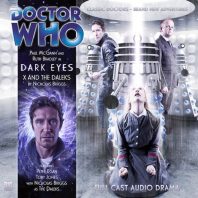
Released November 2012
With Straxus and his TARDIS destroyed, the Doctor and Molly have tracked the notorious Time Lord known only as ‘X’ to the planet Strangor as Dark Eyes draws to a close with a race against time and the threat to the universe involving the Dalek Time Controller and a space-time projector finally revealed and put in motion.
The relationship between the Doctor and Molly has developed at an incredibly quick but believable pace, and the each implicitly knows what the other is thinking when confronted with the next in an ever-continuing series of dangerous encounters with the Daleks. Paul McGann and Ruth Bradley have an easy chemistry together already, and the nuance and pathos that Bradley is able to instill into her character as more and more is learned about her past and as she relives the teasing and bullying she suffered as a child because of her dark eyes that the Doctor now uses as an affectionate nickname is incredible. She continues to demonstrate just how brave she is as she instinctively makes up a cover story to protect the Doctor and remains composed when she brutally discovers that the Daleks whom she had defended as a potential source of good in the preceding tale are unequivocally the monsters of evil that the Doctor spoke of, and though she may choose not to continue to travel with the Doctor when she realises that her beloved employer is still alive as the resolution to Katris’s scheme plays out, she has absolutely made an impact on this Eighth Doctor who was so desperate to find hope with a fierce but kind tenacity that rekindled his own.
‘X and the Daleks’ is filled with incredible ideas, but by revealing that the gripping time ram cliffhanger was a fake ploy put in place by Straxus it continues the trend started with the harmonious Skaro in ‘Tangled Web’ of some of the many fascinating ideas instead being false and ultimately inconsequential. The fact that the Daleks are rather unperturbed by their scheme failing likewise takes away some of the impact from their defeat, but it does not take away from the tremendous intricacies and audaciousness of the plan on display. Indeed, the Doctor’s TARDIS being tucked away within another TARDIS to explain Molly’s familiarity with its systems and their apparent inability to contact Gallifrey is a masterstroke, and Kotris and the Dalek Time Controller whom Kotris rescued from the vortex allying to use the retrogenitor particles that were forced into Molly to wipe the Time Lords from existence provides a thrilling backbone for this conclusion.
Surprisingly for any story let alone a concluding instalment, the Doctor is fairly insignificant to the outcome and is revealed only to have been kept alive previously in order to remain specifically in close proximity to Molly to continue affecting those same retrogenitor particles. Instead, Straxus and Straxus take centre stage as Katris exposes the fact that he is Straxus’s future incarnation borne out of disgust for everything his predecessor stood for and attempted to accomplish. Though again this revelation isn’t the most surprising given the insistence on calling Kotris ‘X,’ it nonetheless opens up a fascinating character study the likes of which only Doctor Who can accomplish, and Kotris saving his former self from suicide to ensure his own survival adds an incredibly unique dynamic that works exceedingly well. Of course, Kotris’s own actions end up being undone when the Daleks murder Straxus regardless of Kotris’s association with them, and it’s this change that spurs Molly’s departure while providing a surprisingly effective resolution from a narrative standpoint that ties up the loose ends but that never amounts to much consequentially from the Daleks’ standpoint since another plan is already in motion.
The latter three stories of Dark Eyes are by design very difficult to distinctly separate and review since they are all so intimately interlinked as one expansive tale. Accordingly, this is a box set that absolutely must be listened to as a box set, but that also means that some of the very best ideas from particular stories don’t feature as much as they might have otherwise while scenes that require several hours to be put into context lose some impact in the short term. Nonetheless, as a story that brings hope to the forefront for a Doctor who so desperately needs it, Dark Eyes is an unequivocal success that makes the most of the bold Molly O’Sullivan with a captivating central mystery that embraces the extreme variability and freedom of Doctor Who as a whole. With incredible performances throughout and wonderful smaller moments interspersing the bigger set pieces, this is a set of four stories with something for everyone that as a singular story only falters a bit by having the Doctor in a less integral role than is typical.
- Release Date: 11/2012


Leave a Reply